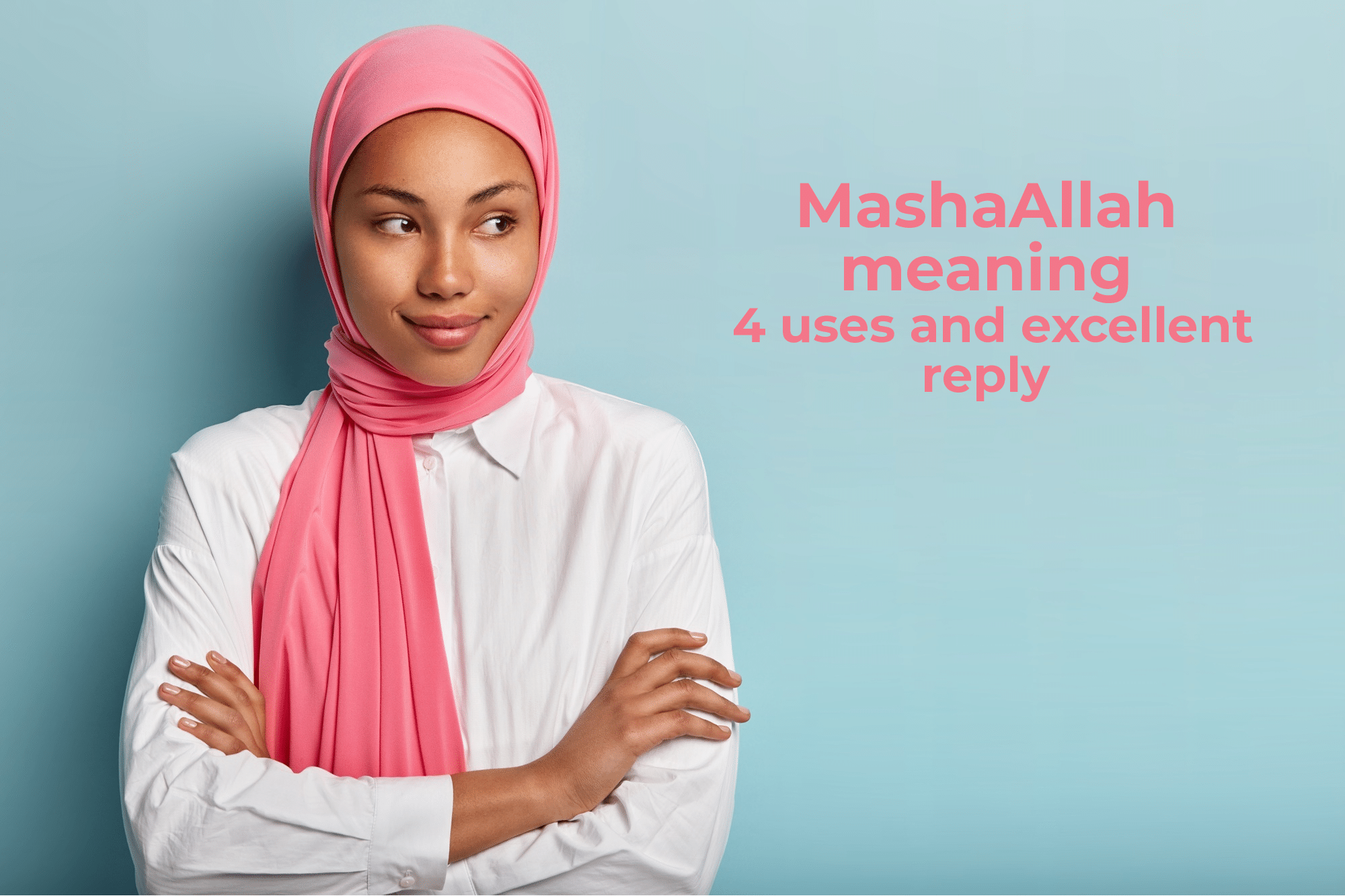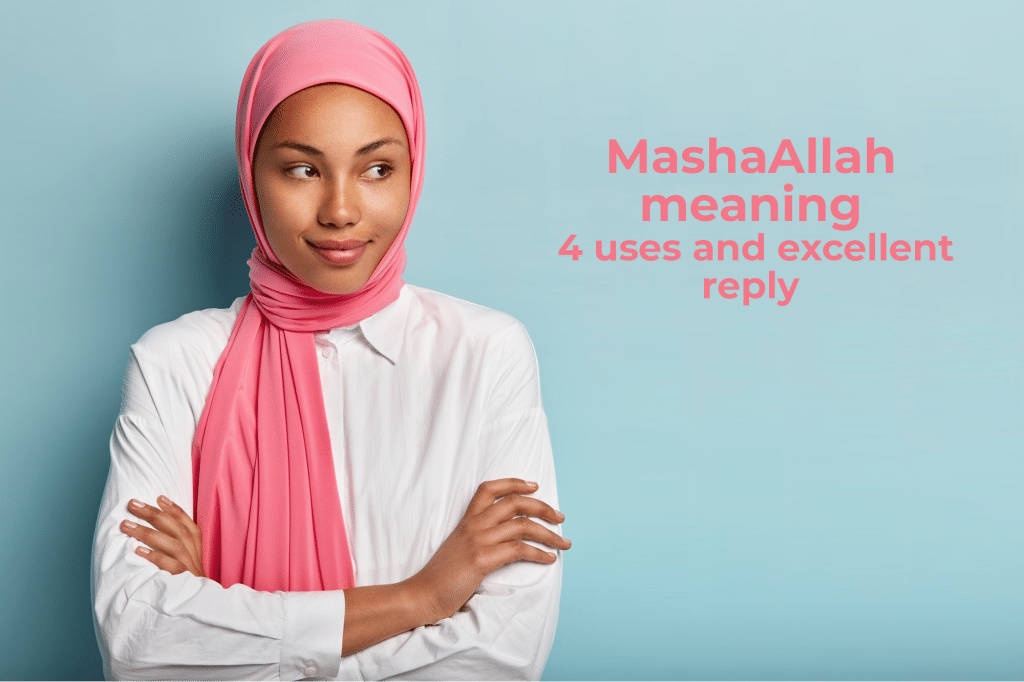The Arabic word ما شاء الله – Mashallah meaning “what Allah has willed has done” or “something God desired.”
Mashallah meaning is frequently used to express gratitude for something good that has happened to a person. It’s a method for Muslims to express their appreciation, and it reminds them that everything is accomplished by God’s will.
It’s a method for us to recognize what Allah, the creator of all things, has placed a gift on us. Saying Mashallah is one method to communicate your awe.
see more about inna lillahi wa inna ilayhi rajiun meaning
IS IT MASHALLAH OR INSHALLAH?
Because these two terms sound similar and have a similar meaning, it’s easy to mix up Mashallah with Inshallah. The fundamental distinction is that inshallah is supposed to desire for a future outcome:
MashaAllah meaning = God willed it.
Inshallah meaning “if God wills.”
Inshallah meaning example: I pray for the arrival of a successful pregnancy, inshallah.
MashaAllah meaning example: *after childbirth* Mashallah, what a gorgeous, happy baby.
Hadith on Saying Mashallah:
Ibn ‘Abbas said: “A man said, to the Prophet, ‘Whatever Allah wills and you will.’ He said, ‘You have put an equal with Allah. It is what Allah alone wills.’”
Tabarak Allah MashaAllah meaning

MashaAllah meaning shows your gratitude to Allah for something you thought was valuable and great. It is an Arabic term that Muslims are said to use to express their awe at something lovely. There is also a passage in the Quran called Surah Tabarak, which enhances individual Muslims’ beliefs.
Because the meanings of both expressions appear to be relatively similar, many Muslims ask if there is any benefit for pronouncing one word than another. This appears to be a legitimate question, however as shown in the research, there is no proof that saying Masahallah is more beneficial than saying Tabarak Allah.
There’s really no hadith that compels Muslims to use one phrase more than another or vice versa. As a result, Muslims have the option of saying Masahallah, Tabarak Allah, or both.
MashaAllah meaning Importance
Every Islamic word refers to Allah and praises his qualities and blessings. So, if it’s mashallah tabarakallah or another phrase, there’s a pleasure and advantage to saying it.
Tabarak, inshallah. Allah mentions Allah and reinforces the concept that it will all happen according to Allah’s will. This belief is also significant. Masahallah Tabarak Allah, on the other hand, should be stated more commonly.
Prophet Muhammad also recommended Muslims to recite it regularly since it increases good acts and brings benefits into their lives. As a result, we should all endeavor to employ these Islamic terminologies instead of other linguistic phrases since they are more important.
The answer mashallah tabarakallah is however followed with Jazakallah, which offers a benediction to Allah, making it more worthwhile and gratifying.

MashaAllah meaning, Keeps FROM EVIL EYE AND Jealously:
It is regarded in certain cultures that saying Masha Allah when anything wonderful happens can protect people from jealousy, evil eye, or jinns. For example, if you recently had a healthy new baby, you might say ‘Mashallah’ to express thanks for the gift Allah has provided but also not jeopardize the infant’s future health.
Use MashaAllah meaning for Celebration and Gratitude
MashaAllah meaning is commonly used to show surprise, praise, appreciation, gratitude, or excitement over a previously occurring occurrence. In essence, it is a method of acknowledging that God, or Allah, created all things and has conferred a bounty. As a result, the Arabic phrase mashallah is commonly used to recognise and thank Allah for the intended outcome.
Examples:
- You’ve given birth to a child. Mashallah!
- You did well on your examinations. Mashallah!
- It’s a lovely day for an outside celebration. Mashallah!
You Look Marvelous: MashaAllah meaning to give a Compliment to an Arab
Many speakers who specialise in enhancing your conversation skills or who promote ways you, too, can win over people and inspire others frequently provide the same advice to individuals seeking those things: Complimenting someone is the finest approach to encourage them to start chatting or to win them over.
The laws of Muslim society are no different, with the difference that a compliment can sometimes be used as a show of envy, primarily among more religious Arabs. Indeed, you must exercise caution while complementing an Arab man’s tie, lest you come home with the tie in your hand after saying goodbye to your new buddy.
Furthermore, complementing an Arab automobile just before he engages in a minor road crash at Amman’s Dachlea Circle may result in you being blamed for the accident, so be cautious while giving out compliments in the Arab world. Here are some more suggestions for giving praises in the Middle east:
1. Begin your complementing statement with “mashallah”…
To fend off any malicious intentions, whether perceived or not, say “mashallah” (“God has willed it”) at the beginning of each complement. It is also an element of the Arabic faith. Then, you will also be blamed for everything that may and will go wrong.
2….and finish with “smallah”
Smallah, which means “halt the envy” and “spare the evil eye,” is used to commend a newborn or something cute. Whereas “mashallah” is used to fend off the evil eye, “smallah” is a straight jab in the eye to chase it away.
3. Knock on Wood
This Celtic or German practice of invoking the aid and shielding of fairies residing in trees found its way into Arabic culture as well. Get anything to knock on as soon as you say “smallah” above, and you’ll be OK. Don’t try to fake it by pounding on your skull and pretending to be a wooden head. It’s not the same thing, and it’s not humorous to those that follow the custom.
4. Incorporate the phrases “yekhze el ein” and “Allah yehmeek” (“yahmeeki” for ladies) into the complement.
That previous (“yekhze el ein”) is like when you’re sick of those jealous eyes following you around, and “Allah yemeek,” which means “May God safeguard you,” coming back for good.
5. Making a remark about someone’s weight (even weight loss) is not a compliment.
Another piece of advice is to never discuss weight – even if you’re attempting to commend someone on their weight reduction. Choose one of the numerous other Arab qualities and features to commend someone on. Even if you say, “My goodness, Muna, you look gorgeous once you’ve dropped all that weight,” Muna will interpret it to mean, “My goodness, Muna, you don’t seem as large as a house anymore,” regardless of your intentions.
MashaAllah meaning Outside of Muslim Usage
Since Arabic Muslims use the term ‘Mashallah’ so frequently, it has already become a widespread component of the vernacular between Muslims and non-Muslims in Muslim-dominated places. The term is commonly used in Turkey, Chechnya, South Asia, sections of Africa, and other places that were historically part of the Ottoman Empire. It typically alludes to a task well done when used outside of the Muslim religion.
Response to mashallah
As previously said, it is an Islamic word that rewards you for expressing it, thus there is a reaction. Whenever the Muslim says to you, Masahallah Tabarak Allah, you must react with good words that have significance. You can respond to Masahallah Tabarak Allah with a variety of Islamic words since Islam teaches us to only exhibit love and compassion.
One of the replies may be an Islamic phrase such as ‘JazakAllah Khair,’ which means ‘I pray to Allah to reward you with good.’ This word also conveys a blessing to Allah as well as an affectionate sentiment towards the other person. Another possible reaction is ‘Barakallah feel,’ which means may Allah bless you.’ It also has a similar connotation as Masahallah Tabarak Allah, therefore it can be used to answer to it for someone else.
Our Islam is the only religion that encourages love and affection, regardless of faith or language. Islamic phrases such as Masahallah Tabarak Allah are one example of a language. We Muslims must support the use of these expressions in our everyday conversations in order to reap the benefits promised by Allah Almighty.
We should search for guidance from experiences and the Quran, which utilizes these Islamic terminologies. This will deepen our conviction and entice Muslims to the use of Masahallah Tabarak Allah.



